Description
*Nominal Size: In manufacturing, a nominal size or trade size is a size “in name only” used for identification. The nominal size may not match any dimension of the product, but within the domain of that product the nominal size may correspond to a large number of highly standardized dimensions and tolerances.
Tested using international standards, ASTM C 652-12: Standard Specification for Hollow Brick (Hollow Masonry Units Made From Clay or Shale)
| Specific Clauses | Acceptance Criteria | |
| Classification | Grade – MW, Type- HBS , Class- H60V | |
| Weathering Index | N/A | |
| Compressive Strength | Min. Av. of five (5) samples 20.2N/mm². Individual 17.2 N/mm² | |
| Absorption | Max. Av. of five (5) samples 17 %. Individual 20 % | |
| Face & End Shell Thickness | < 101 mm unit Min. 17 mm for both Face & End shell thickness. For 150 mm unit Min.19 mm for both Face & End Shell thickness. | |
| Dimensions | ≤ 102 mm (±4mm) >102mm to ≤ 152mm (5mm) | |
| Warpage | ≤204mm (3mm),>204mm to ≤ 306mm (5mm) >306 to ≤408 (7mm) |
ABEL Clay offers a better block, a superior block as compared to alternative building materials. In addition to clay’s natural properties, which make it stronger than other building materials, ABEL Clay’s new factory, TK4, the most technologically advanced clay facility in the Western hemisphere, enables a quality manufacturing process.
For more information, download the Clay brochure here.
Why choose ABEL Clay?
Strength you can trust
Clay blocks possess more than enough strength to meet the new building requirements and codes.
Foundation that lasts a lifetime
Clay foundations will not deteriorate over time due to acids and alkaline in the surroundings and saltwater.
Reduction in labour Cost
ABEL Clay blocks are significantly lighter than concrete.
Reduced Downtime
Clay absorbs less water and dries faster, so there is less downtime during construction.
Thermal resistance
Hollow clay blocks provide far better thermal insulation than any other comparable material – 70% advantage in thermal resistivity when compared to concrete blocks (IEEE442 and ASTM5334 tests).
Fire resistance
Clay is non-combustible and as such cannot contribute to the start or rapid spread of fires – clay walls obtain maximum ratings.
Sound Resistance
Since hollow clay block walls and partition are lightweight and honeycombed with cells, they are highly resistant to the transmission of sound.





